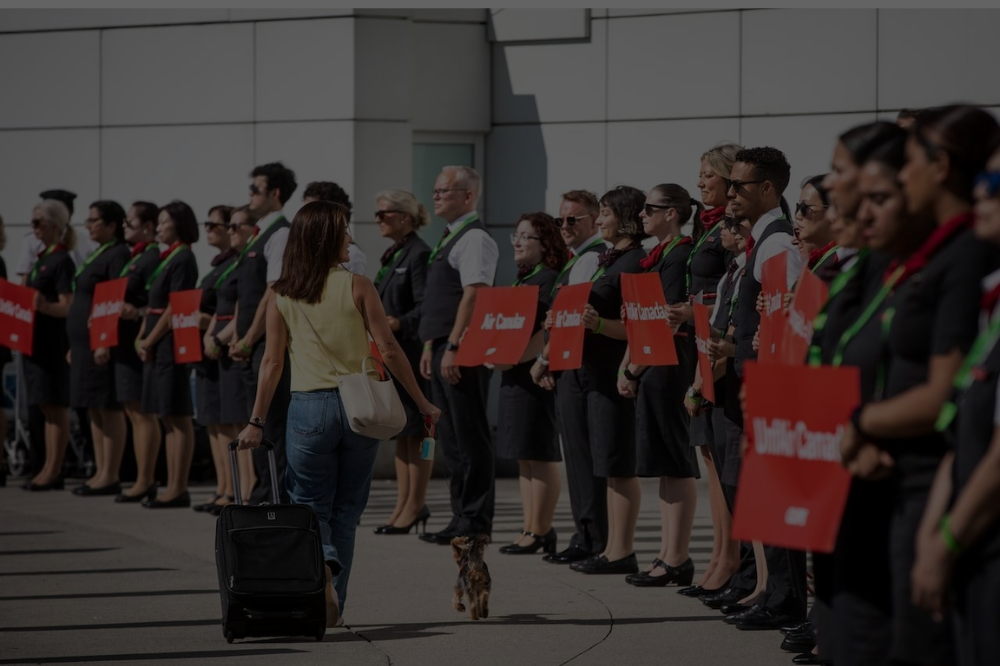Air Canada passengers face widespread disruptions as the airline begins canceling flights ahead of a looming strike by flight attendants. With over 130,000 daily customers potentially affected during peak summer travel season, here’s everything you need to know about the situation and how to protect your travel plans.
The Canadian Union of Public Employees (CUPE), representing 10,000 Air Canada flight attendants, issued a 72-hour strike notice early Wednesday after contract negotiations reached an impasse. The strike is scheduled to begin at 1:00 AM EST on Saturday, but flight cancellations have already started as the airline positions aircraft and crews ahead of the work stoppage.
This labor dispute centers on wage increases and unpaid work issues that have been brewing for over eight months. For travelers, the timing couldn’t be worse—summer travel season typically sees the highest passenger volumes of the year.
Timeline of Flight Disruptions
Air Canada has outlined a phased approach to managing the strike impact:
- Thursday: First wave of Air Canada and Air Canada Rouge flight cancellations begins
- Friday: Additional flights canceled as the airline continues positioning aircraft and crews
- Saturday, 1:00 AM EST: Complete cessation of flying begins
Air Canada Express flights, which handle approximately 20% of the airline’s daily customers, will continue operating normally throughout the strike period.
The airline operates a fleet of 259 aircraft across 64 countries, making this disruption significant for both domestic Canadian travel and international connections.
Toronto Pearson International Airport, Canada’s busiest hub, is closely monitoring the situation and advising passengers to check directly with Air Canada for flight updates.
What’s Behind the Labor Dispute
The contract negotiations have stalled over two primary issues: compensation and unpaid work requirements.
Air Canada has offered flight attendants a 38% increase in total compensation over four years, including a 25% raise in the first year. However, CUPE argues this offer falls “below inflation, below market value, below minimum wage” and fails to address unpaid work hours.
Flight attendants currently work unpaid during boarding procedures and while waiting at airports between flights.
The union contends that these unpaid hours significantly reduce their effective hourly wages, making Air Canada’s compensation offer inadequate despite the headline percentage increases.
CUPE also criticized Air Canada’s request for government-directed arbitration, stating the airline “didn’t come to the table in good faith” during eight months of negotiations.
Earlier this month, 99.7% of union members voted to authorize strike action, demonstrating widespread support for the labor action.
Your Rights as a Passenger
Air Canada has committed to providing full refunds for canceled flights and is working with other Canadian and international carriers to offer alternative travel options.
However, rebooking on partner airlines may take time and might not be immediately available due to high demand during summer travel season.
Under Canadian passenger protection rules, airlines must compensate travelers for flight disruptions within their control.
However, labor disputes typically fall under extraordinary circumstances, which may limit compensation beyond refunds and rebooking assistance.
Passengers should document all expenses related to flight changes, including meals, accommodation, and alternative transportation. While immediate reimbursement isn’t guaranteed, maintaining records can be valuable for potential future claims.
How to Protect Your Travel Plans
Check flight status frequently: Air Canada is notifying affected passengers directly, but flight statuses can change rapidly during labor disputes.
Don’t go to the airport without confirmation: The airline specifically warns passengers without confirmed flights to avoid airports, as rebooking options may be limited at check-in counters.
Consider travel insurance: If you haven’t purchased coverage yet, policies bought before a strike announcement may cover related expenses.
Explore alternative airlines: WestJet, Porter Airlines, and other carriers may have availability, though expect higher prices due to increased demand.
Be flexible with dates: If your travel isn’t urgent, waiting until after the strike resolution may offer more options and better prices.
Economic Impact and Resolution Prospects
The strike affects approximately 25,000 Canadian passengers daily, with international travelers adding to the total disruption.
Air Canada warns the unplanned shutdown poses “a major risk” to the company and its employees, creating pressure for swift resolution.
Government intervention remains possible, though CUPE has criticized Air Canada’s earlier requests for federal arbitration.
Labor disputes in essential services sometimes prompt government action, particularly when they significantly impact the traveling public.
The airline industry’s recovery from pandemic-related disruptions makes this strike particularly challenging. With summer travel demand at near-record levels, alternative booking options are limited and expensive.
Looking Ahead: When Normal Service Resumes
Air Canada states it has positioned aircraft and crews to “more quickly restore regular service” once the strike ends. However, returning to normal operations typically takes several days as crews return to duty and aircraft are repositioned.
Passengers should expect continued delays and limited availability for several days after any resolution.
The airline’s hub-and-spoke system means disruptions in major centers like Toronto, Vancouver, and Montreal can create cascading delays throughout the network.
What This Means for Future Travel!
This labor dispute highlights ongoing tensions in the airline industry as carriers balance post-pandemic recovery with employee demands for improved working conditions.
Flight attendants across the industry have raised similar concerns about unpaid work time and compensation that hasn’t kept pace with increased responsibilities.
For travelers, the situation underscores the importance of flexible booking policies and comprehensive travel insurance.
As the industry continues recovering from pandemic disruptions, labor disputes may become more common as unions seek to address years of deferred wage increases and benefit improvements.
The Air Canada strike serves as a reminder that even well-planned trips can face unexpected disruptions. Staying informed about your rights, maintaining flexibility in your travel plans, and having backup options can help minimize the impact of such situations on your journey!

